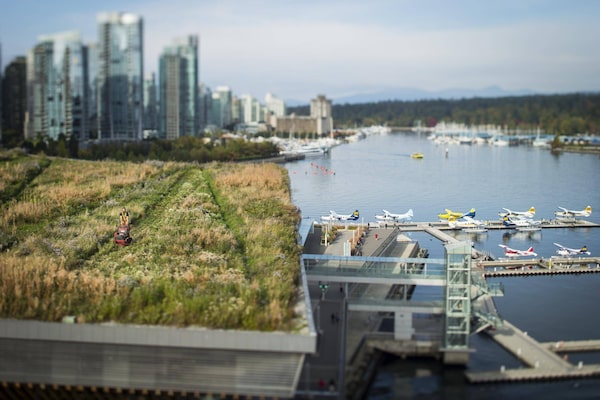
The six-acre green roof above the Vancouver Convention Centre. Toronto-Dominion Bank’s new Greensights Report, found that one third of those surveyed believed that green-space improvements should be paid for by partnerships between government and private enterprise.John Lehmann/The Globe and Mail
As Canada's urban centres continue to build upward and outward, the squeeze on community green spaces is being felt more keenly than ever.
While many can agree that sacrifices need to be made to preserve and build spaces for relaxation, connecting with nature and spending time with friends, a new survey reveals that many Canadians feel that commercial property should be the No. 1 thing to make way.
Toronto-Dominion Bank's new Greensights Report, released Tuesday in conjunction with Environics Canada, surveyed more than 1,500 Canadians on green spaces. Forty per cent of those surveyed agreed that preserving green spaces should come at the expense of commercial property, ahead of both housing (24 per cent) and parking (20 per cent). Four per cent said that green space does not need to be preserved.
"We can't take our neighbourhood community green spaces for granted any longer," says Karen Clarke-Whistler, TD's chief environment officer. "We always have expected them to be around, but as we think about today, and more importantly, the future, these are spaces that are absolutely critical to the health of the city."
They are also an important draw for people looking to put down roots. Eighteen per cent of respondents picked the availability of green spaces as the third most important factor in choosing where to live, behind only the proximity to good schools (23 per cent) and easy access to transit (19 per cent).
While 95 per cent of those surveyed agreed that access to green spaces will be important to their quality of life in the future, when it comes to funding them, there are a variety of opinions. Eighty per cent of respondents said that government must play the leading role financially, with 48 per cent feeling that funding should be the sole responsibility of government.
However, one third of those surveyed (36 per cent) believed that green-space improvements should be paid for by partnerships between government and private enterprise.
"I think we see there's a great appetite for more to be done," says Ms. Clarke-Whistler. "There are groups that want to be involved in improving [green spaces], so is there an opportunity there for us all to sit down and look at how the management and governance of these spaces can be made fit for purpose for the future?"
 Paul Attfield
Paul Attfield